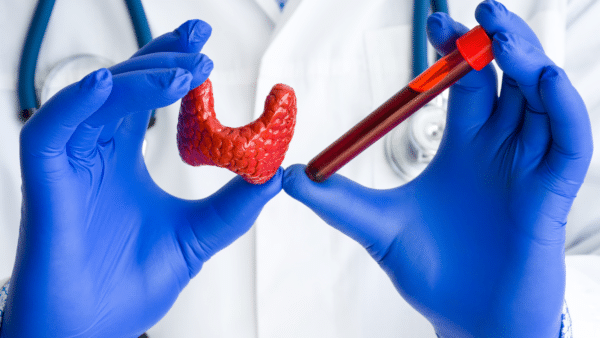Overview of Thyroid Function and Hormones
The thyroid gland, a small butterfly-shaped organ that is at the base of the neck, plays a pivotal role in regulating various metabolic processes throughout the body through the secretion of thyroid hormones. Hormones are essential for functioning of our body’s cells, influencing metabolism, growth, and development.
Types of Thyroid Hormones
There are two types of thyroid hormones that the gland produces:
- Thyroxine (T4): This is the major hormone produced by the thyroid gland, constituting about 80% of the thyroid hormone released into the bloodstream. T4 is considered a prohormone, as it requires conversion into its active form.
- Triiodothyronine (T3): Although less is produced, T3 is the active hormone and is several times more potent than T4. It primarily results from the conversion of T4 in organs such as the liver and kidneys.
Production and Regulation of Thyroid Hormones
The secretion of thyroid hormones is carefully regulated through a feedback mechanism that involves the hypothalamus and the pituitary gland.
- Thyrotropin-releasing Hormone (TRH): The thyroid-releasing hormone (TRH) is generated in the hypothalamus and it prompts the pituitary gland to release thyroid-stimulating hormone (TSH).
- Thyroid-Stimulating Hormone (TSH): TSH, released by the pituitary gland, directly influences the thyroid gland to produce and release T4 and T3.
- Feedback Loop: The levels of T4 and T3 in the blood regulate the production of TRH and TSH, maintaining a balanced production of thyroid hormones.

Functions of Thyroid Hormones
Thyroid hormones are crucial for:
- Metabolic Rate Regulation: They determine the speed at which your body’s cells work, influencing overall energy levels and temperature regulation.
- Growth and Development: Particularly critical during infancy and childhood for normal development.
- Heart Function: These hormones influence heart rate and overall cardiovascular health.
- Digestive Function: Thyroid hormones aid in maintaining proper digestive tract speed.
- Muscle Control: They affect the tone and function of muscles.
- Brain Development and Function: Crucial in the development of the brain and ongoing neurological function.

Thyroid Hormone Imbalances
Imbalances in thyroid hormones can lead to disorders such as hypothyroidism (low hormone levels) and hyperthyroidism (high hormone levels), each presenting with distinct symptoms.
Hypothyroidism
- Symptoms: Fatigue, weight gain, cold intolerance, slow heart rate, and depression.
- Causes: Autoimmune disease (Hashimoto’s thyroiditis), surgical removal of part or all of the thyroid, and certain medications.
Hyperthyroidism
- Symptoms: Weight loss, heat intolerance, anxiety, rapid heartbeat, and sleep disturbances.
- Causes: Autoimmune disorder (Graves’ disease), nodules on the thyroid, and excessive iodine intake.

Diagnostic and Treatment Approaches
Diagnostic Tests
- Blood Tests: Measure levels of TSH, T4, and T3 to assess thyroid function.
- Ultrasound: Checks for thyroid gland abnormalities and nodules.
You can find out more about how to order a thyroid blood test online here.
Treatment Options
- Hypothyroidism: Typically treated with synthetic thyroid hormone levothyroxine.
- Hyperthyroidism: Treatment options include radioactive iodine, anti-thyroid medications, and sometimes surgery.
Importance of Regular Thyroid Function Monitoring
Regular monitoring of thyroid function is essential, especially for those diagnosed with thyroid disorders or at risk of developing them. Regular blood tests ensure that thyroid hormone levels are within a healthy range and that treatments are effectively managing the condition.

Conclusion
The thyroid gland, though small, has a significant impact on overall health through the production of thyroid hormones. Understanding its function and the vital role these hormones play in our body is crucial for maintaining optimal health. Regular medical supervision and appropriate treatment are paramount for those dealing with thyroid disorders.

